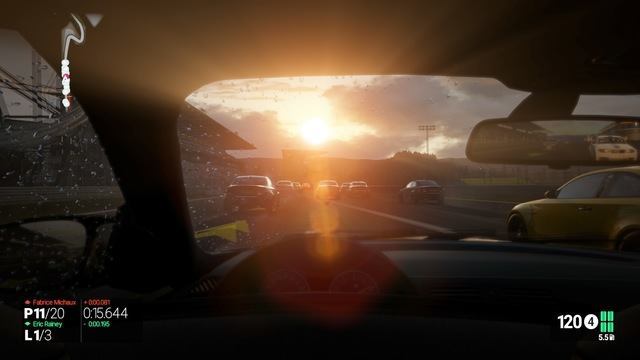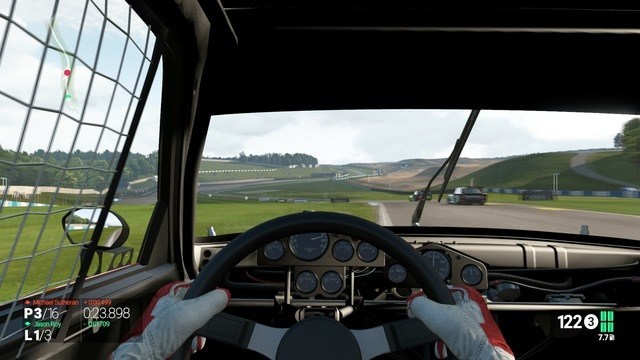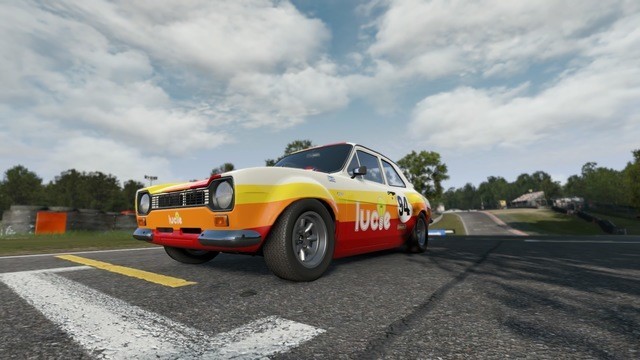Baked by a sizzling sunset, Dubai Autodrome International is the race’s host. Dramatic orchestrated music play over the loading screen. A vocalist begins a haunting, even stirring, Latin chorus.
And this flourish is for a 125cc professional kart race – the minor leagues.
Yes, there are professional kart racing circuits: The United States Pro Kart Series. KF1. Superkart. There are more, too. Project Cars knows this because it knows more about cars than you do (likely, anyway). It loves cars. Their sound. Their look. Their paint. It finds no fault in their existence as machines.
There is something beautiful in Project Cars’ technical purity. Screens fill with text. Adjustable lines indicate numerous indecipherable vehicle tweaks. There is an entire language to Project Cars dedicated to the enthusiast, a dialect understood by the privileged and few else. The poor layman is an outcast.
To some extent, Project Cars is accessible. Racing lines, steering assistance, AI difficulty, etc. There are a plethora of options to make such tremendous depth manageable. Leaderboards sort out the “know” from the “know nots,” those who have steering wheels from those who don’t, and those who enjoy aggression from those who appreciate racing purity.
Obsession is Project Cars only real dressing.
But to make it function on such an available level is to dry it out and flatten an already inactive presentation. Obsession is Project Cars’ only real dressing. Music is absent during the race; the shifting of gears is the sole rhythm in the background. Races have no pomp and circumstance, no celebrations, no elation upon victory. There is no emotion, just pistons and oil. Career play has no face, merely passive emails and scrolling social media feeds to show if fans are elated or disgusted. The repetitive niceties of the public internet at large is Project Cars one dose of unreality.
Reality Simulated Without Charisma
Real, real, real, real. That marketing message is Project Cars’ heartbeat. It would be a sensational virtual reality product, swelling with dazzling rainstorms and in-car helmet views. Dropped into a 3D headset, Project Cars would come alive. However, as with a swarm of first-person shooters featuring a real-world gun pointing toward a faceless target, Project Cars is utterly devoid of attributable charisma. It exists only to tirelessly simulate. Differentiation from the competition is more critical than Project Cars seems to realize.
Sony’s Gran Turismo did it first. Then came Microsoft’s Forza interspersed with EA’s occasional sim, Need for Speed. Compare screenshots of each, and only Forza can stand out. Project Cars models licensed vehicles down to individual stitching. Such accurate replication is gorgeous in its own way, but stitches are only stitches. There is no character to a stitch on a steering wheel. Comprehensive authenticity is familiar now that technology allows it be.
Project Cars models licensed vehicles down to individual stitching. Such accurate replication is gorgeous in its own way, but stitches are only stitches.
Certainly, such a video game is designed to be showed off. In-game messages ask players to add images from their garage to a developer-made Flickr account or stream their gameplay sessions. Somewhere in there is the showmanship of car culture – “My engine is better than yours” – so Project Cars knows exactly what it is doing to embed itself amongst the legion of motor enthusiasts. A future sequel should have a visual engine edit mode. The available tweaks are close as is. Then, some paint touch-up (plus added waxings and washes) and oil changes, too. Customizable pit crew strategies – giving precedence to tires, fuel, or damage – glance the idea anyway.
Making it Personal (or not)
Maybe the issues lie with how impersonal Project Cars chooses to be. Without a currency system or unlocks, nothing feels earned. Cars are not “yours.” None of these vehicles will be named after a woman. They belong to everyone, because everyone has access to the same things.
Such an exacting methodology is a dreamscape for admirers of dialed in Fx, Fy, and Fz scales
No longer is this a situation of have/have nots (except for DLC). Competition is fair, and yet the loss of a physical accomplishment – that thrill of buying parts, building, then driving – is gone. CaRPG this is not. Partway through a career which consists of an apathetic march through a calendar, lonely practice sessions, qualifying runs, then the crowded race, it’s a wonder when Project Cars will have a point. Learning multiple driving disciplines? Virtual trophies? Ho hum, at least to all outside of the devoted lap time watchers.
Project Cars is the result of a daunting developmental task. Nothing this adherent to the rules of Earth’s physics could be anything less. Such an exacting methodology is a dreamscape for admirers of dialed in Fx, Fy, and Fz scales, because Project Cars has those… and more too: individual tire pressure, chassis height, brake adjustments, exhaustive difficulty sliders. It’s a list best left for marketing to cover in totality. Yet, even with that bevy of adjustments, it’s strange how little these projects feel like your own. They exist as yours, but briefly. The next calendar date always takes them away.










Published: May 15, 2015 09:08 am